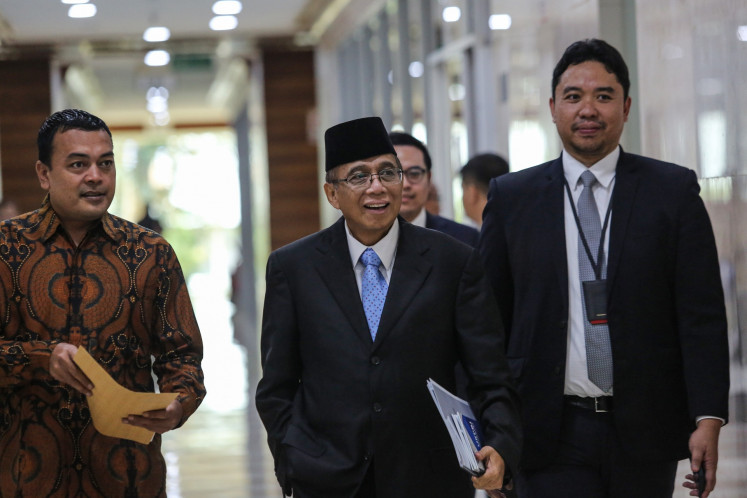Popular Reads
Top Results
Can't find what you're looking for?
View all search resultsPopular Reads
Top Results
Can't find what you're looking for?
View all search resultsIs there a future for educated youth in rural Flores?
With the upcoming transition of power to president-elect Joko âJokowiâ Widowo, commentators have lined up to warn about the many challenges Indonesia faces in the coming years
Change text size
Gift Premium Articles
to Anyone
W
ith the upcoming transition of power to president-elect Joko 'Jokowi' Widowo, commentators have lined up to warn about the many challenges Indonesia faces in the coming years. One of these challenges is to create new jobs, in particular for the young and educated.
Concerns about job creation are often only considered in the context of major urban areas. The reason for this is twofold: These areas are centers of education and function as migratory magnets, especially for young people. However, it is important to remember that issues of un- and underemployment are not merely urban problems. For example, in central Flores in East Nusa Tenggara (NTT), in the small rural district of Ngada, literally hundreds of educated young people are struggling to find appropriate entry-level jobs.
These young people, most of them with Bachelor's degrees, are part of a growing cohort in central Flores who experience troubled education-to-work transitions. Increasing numbers of young people find their way to tertiary education institutes, away from their native villages, in cities like Ende, Kupang or Makassar. While it is true that many of these educated young people stay in the cities of their education, a large cohort of them also returns to their rural native area, often motivated by strong feelings of belonging.
However, in rural Flores, job prospects for educated young people are downright poor. In Ngada, most people still rely on agriculture for their livelihoods, or the bureaucracy. Unfortunately, the local government has trouble hiring these new graduates, due to budget constraints. For about two years now, there have been no new job openings in government agencies.
This is a serious issue for educated young people as there are few other job opportunities in this small district. And while there is always the option of going back into agriculture, there is common agreement among older generations that 'young people don't want to be farmers, because they're scared of getting dirty'.
Though it might be true that educated young people are reluctant to return to farming, people in central Flores also mention that educated young people are not supposed to work in agriculture. After all, education is often considered expensive and the young people's education is often made possible by the efforts of extended families.
_____________
Some 1,000 new graduates with Bachelor's degrees will each year flood the local labor market.
Therefore, a career as a farmer is considered to be off limits for these educated young people, as such a career is associated with backwardness and economic precarity.
Studying these educated young people in Ngada district for almost a year, I noticed that while their transition into appropriate and stable-income jobs is frequently troubled, they are not being idle. Instead, many are active community members. Many are (semi-) volunteers, for example at local health posts, or in the church. Others organize youth activity programs, like soccer tournaments, work at local radio stations, or take on casual teaching jobs at significantly lower wages (so-called honorer) than their colleagues working on official contracts.
These un- or underpaid activities are partly inspired by opportunism: Young people hope to open new channels to arrange paid jobs and, through these activities, young people are able to gain new experiences useful in their quest.
But many young people also genuinely feel that they should contribute to the well-being of their communities with their knowledge and skills. They express a strong feeling of belonging to Ngada district, and do not want to leave to other places or cities far away. That is also because these educated young people often still rely on their extended social networks, and thus rarely have to worry about the basic necessities for survival, such as food and a place to live. This reliance is commonplace in central Flores..
The image of educated young people looks rather peaceful, despite their troubled education-to-work transitions. However, these transitions actually are a great threat to rural communities.
Besides the personal drama of not getting the desired and imagined job, one of the most important effects of un- or underemployment after graduation is that young people remain dependent on parents. They lack the financial stability to buy or make their own house, and, therefore, also postpone marriage. As a result, these educated young people fail to become socially accepted adults.
In that way, educated young people's troubled transition into work endangers the reproduction of social safety networks, and thus the community in general.
Meanwhile, in the capital of Ngada district, a town of about 15,000 inhabitants, a new campus of Kupang-based Undana University recently opened. In a few years, some 1,000 new graduates with Bachelor's degrees will each year flood the local labor market, full of hope and ambition. Sure, this fits very well within the developmental discourse about education as a means to rural development.
It is true that Ngada still lacks many basic facilities, and that talented young people are needed to solve this lack in development. But with few actual employment opportunities in Ngada district for the current generation of university graduates, what options will there be for future educated cohorts in rural Flores?
Already, there are waiting lists of hundreds of young women and men with nursing degrees for a volunteering position at the local health posts, let alone for paid work. And at many schools, more than half of the staff is hired on honerer-contracts, without much more room for expansion.
The problem of a growing cohort of unemployed and underemployed educated young people in Indonesia is complex as educational strategies, labor regulations and communal values intersect. Whatever the solution, changes need to come quickly, because with unchanged policies, even volunteering positions become unattainable.
When thinking about education as a tool for development, we should ask ourselves: what future is there for educated young people in Flores?
_____________
The writer conducted research about an increasing cohort of educated young people in small rural communities in Flores for his PhD in anthropology and Asian studies at the University of Western Australia.










